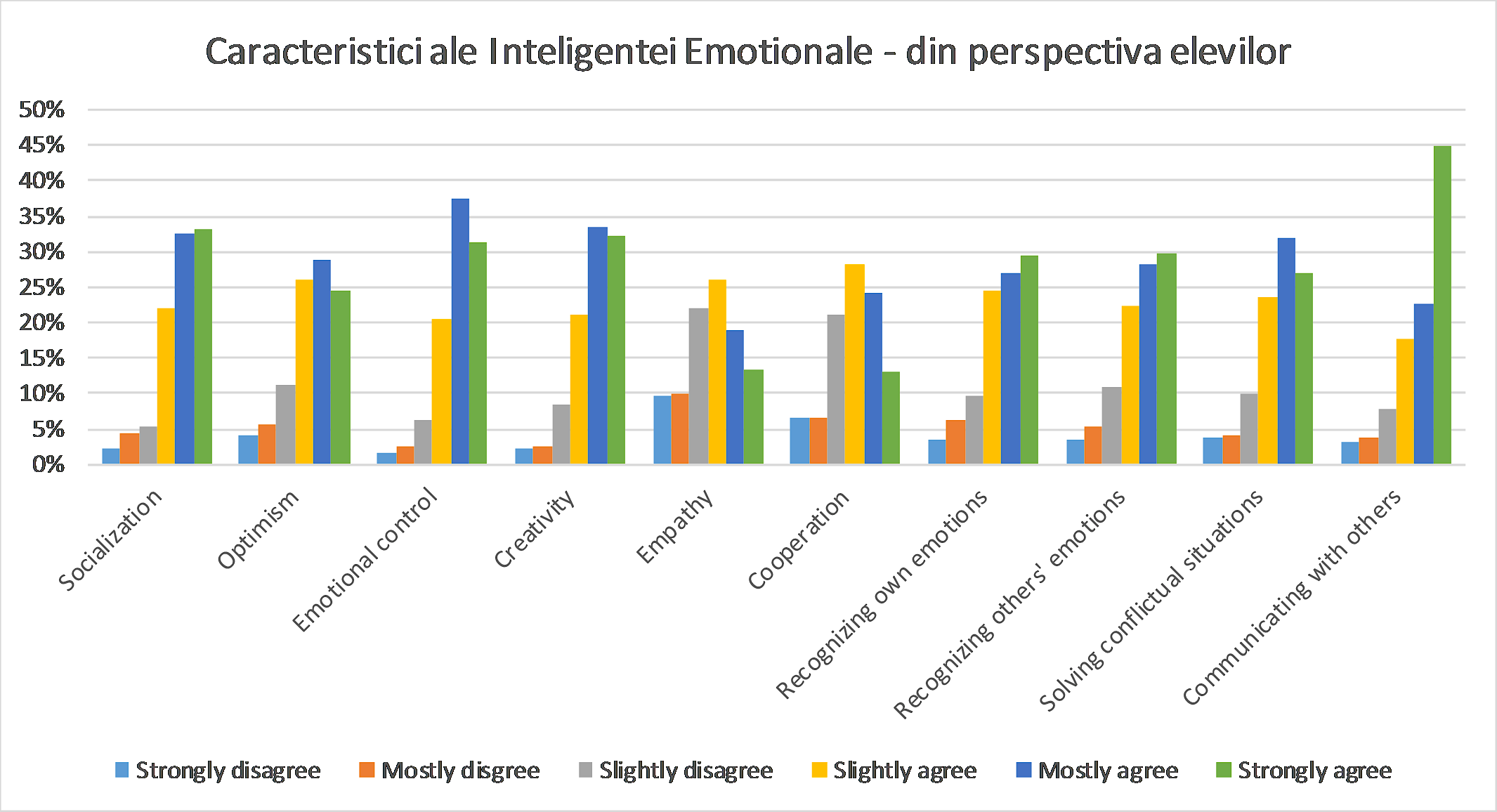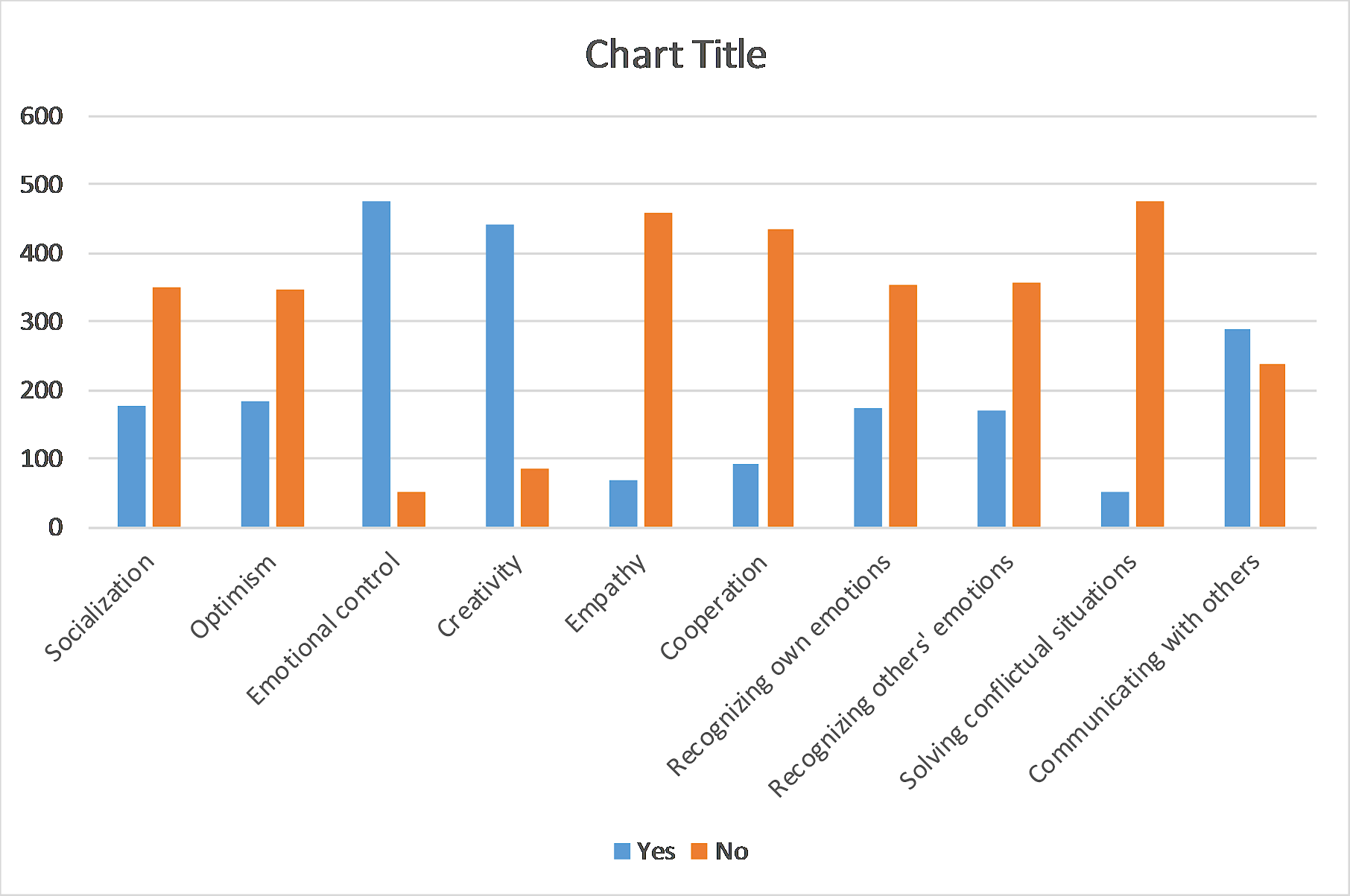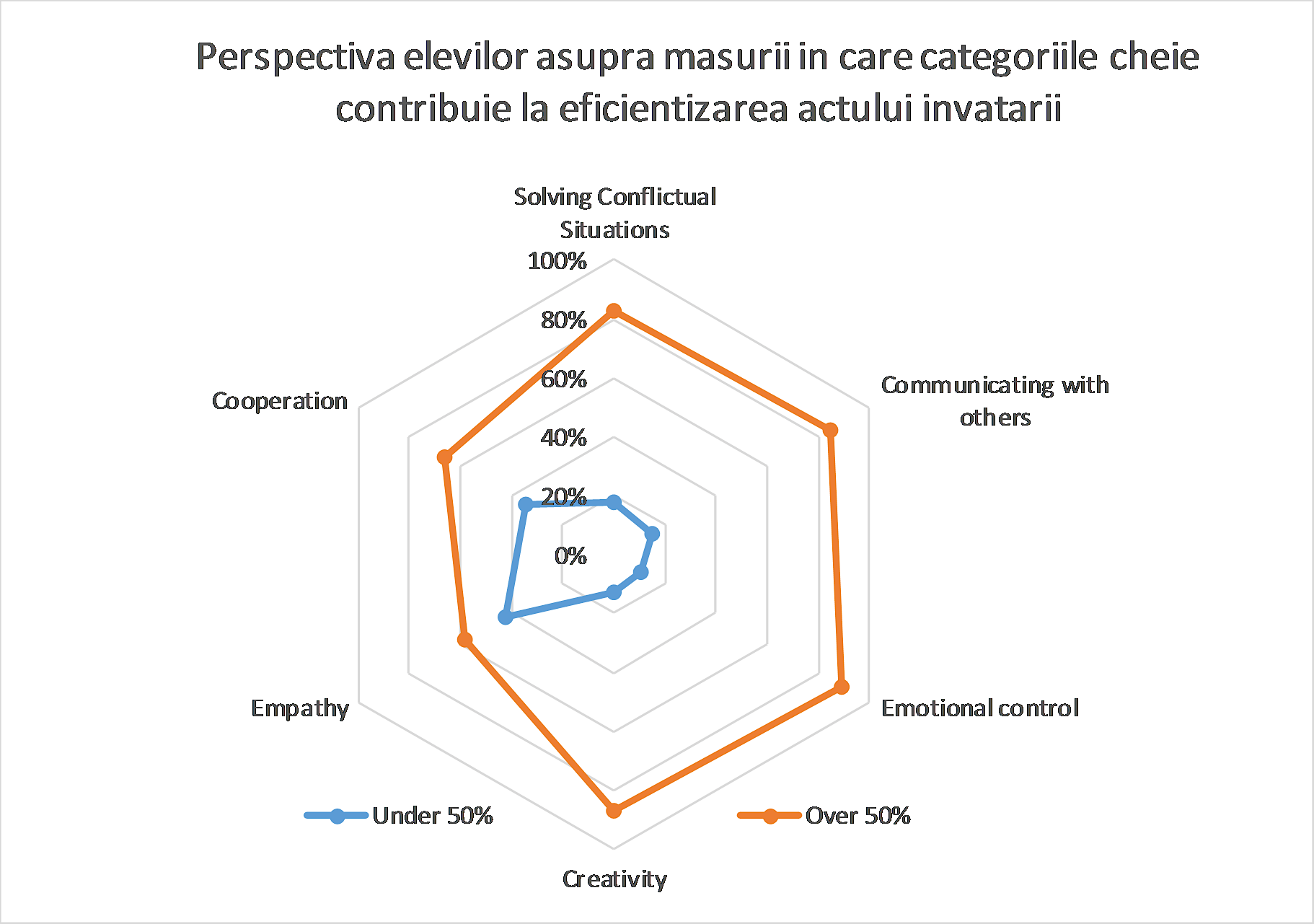Abstract
Recent research in Psychology stipulates that the Emotional Intelligence represents an important resource underpinning for the success in life, along with the general intelligence or the academic one. The Emotional Intelligence involves the individual’s ability to understand the own emotions, the ability to perceive the emotions (including other ones), but also to feel compassion, to be self-motivated, to perseverate, to restrain impulses and to postpone immediate satisfactions. It contributes to the integration of the emotional processes in the general functioning of the psyche and relationships and interaction with others. The emotional intelligence is interrelated with the general intelligence of the person causing how positively harness the powers they have, including the IQ. The paper tries to illustrate whether the Emotional Intelligence characterizes the young students’ psychological structure, in the particular context of Science education (secondary level), and how this is valued by them in the Science learning process. The analysis was made in the frame of the European FP7 Project entitled “
Keywords: Emotionsacademic intelligenceemotional intelligencestudentsPROFILES project
Introduction
Emotional intelligence is a relatively new, complex and topical concept, which refers to a dynamic and inexhaustible resource available to the individual - his/her emotions, as well as his/her capacity to identify the most efficient ways of controlling and profitably using his/her affective potential, in order to acquire the success in life. At the mental level, there are two different ways of
Definition and specific of emotional intelligence
Purely etymologically, the word
Intelligence can also be defined as the power to learn or understand, the aptitude of knowing, of understanding something, it is the capacity of adequately answering the demands of the world, it is what allows one to reflect, research, control and interpret reality (Torralba, 2012, p. 16). David Wechsler defines intelligence as the individual’s global capacity of acting in order to attain a certain aim, to think rationally and to adapt efficiently to the environment in which he/she lives (Wechsler, 1950). The same author - known for the realization of standardized intelligence tests - observed the fact that the individual’s adaptation to the environment he/she lives in is realized using both cognitive and non-cognitive elements (which include affective, personal and social factors), suggesting the importance of the affective component of the intelligence for the individual’s success in life (Roco, 2004, p. 139). Other researchers as well, such as Robert Thorndike (1920s) or, later on, Howard Gardner (1983), mentioned other types of intelligence than the general one, namely social intelligence or multiple intelligences, which would be especially important for school success and not just for it.
The emotional intelligence is a complex concept, about which certain researchers (Bar-On, 1997; Goleman, 1995, 1998) claim that it includes almost everything that is related to success and is not measured by the general intelligence (IQ), representing the ability of a person to be aware, to access and to generate emotions and to take care of his/her own thoughts, to understand emotions and emotional knowledge and to reflexively control his own emotions, and to promote intellectual and emotional development (Mayer, & Salovey, 1997). The emotional intelligence involves a series of non-cognitive capacities, skills and aptitudes influencing the person’s capacity to succeed in the adaptation to the environmental demands and pressures (Mayer, Salovey, & Caruso, 2011, p. 109).
M. Roco (2004, p. 141) considers that emotional intelligence includes the following specific capabilities:
self-awareness of one’s own emotions: introspection, recognition of a feeling;
mastering one’s emotions: identifying certain methods to face one’s emotions;
inner motivation: channeling one’s emotions and feelings, in the sense of achieving a proposed aim, accompanied by the emotional control;
empathy: capacity of showing sensitivity and care to other people’s problems, of walking in the other person’s shoes;
establishing and directing inter-human relations: knowing, analyzing and controlling other people’s emotions.
The individual’s intellectual capacities are inborn and almost constant throughout life. Our intelligence coefficient is the one that helps us understand and approach the world at a certain level, but our emotions help us understand ourselves and the others. The intellect helps us looking at things, objectively; yet, without an awareness of our emotions, without recognizing and profitably using our emotions, in an adequate behavior, we cannot develop harmonious relations with the people around us, we cannot make decisions easily and we cannot discover our own self (Segal, 1999, p. 15).
D. Goleman (2008, p. 64) considers that emotional aptitudes are meta-skills determining how well we can use the skills we have, including the pure intelligence. The results of the researches of the recent years suggest the fact that the individual’s success in life depends four times more on his/her emotional intelligence than on his/her rational intelligence.
The development of emotional intelligence in the school context
The acquisition of children’s emotional skills - in a variety of contexts - has as consequences, on the level of their behavior, the following: the aptitude to manage their emotions efficiently, the living of a feeling of subjective welfare and adaptive resilience (capacity of rapid redressal) in front of future stressful situations (Saarni, 2011, p. 88). In a school context, the development of the emotional intelligence is at the basis of the functioning of the normal psychic mechanisms, of the construction of one’s self-image and is involved in the coping, stress-adaptation mechanisms.
Ioan Neacșu (2010, p. 215) considers that emotional intelligence is a metacognitive structure on which depend the manner and the efficiency of a pupil’s, a student’s or a teacher’s use of his/her cognitive intelligence, and also of other mental, volitively, attitudinal skills and associated values. Out of the skills specific of the emotional intelligence, we can remind: social skills/abilities, communication, positive thinking, problem-solving, team work, cooperation, assertiveness, leadership skills, empathy, emotion recognition and management, solving conflictual situations. D. Goleman (2008, p. 58) considers that success in life is determined both by the general intelligence, but also by the emotional intelligence, and the emotional skills developed are positively correlated with school performances (Goleman, 2008, p. 357).
The awareness of the value that this resource can have as a factor of school success, of academic, professional and social success, creates the premises of certain changes in the traditional conception of the educational system; the paradigm of emotional intelligence (or socio-emotional intelligence) anticipates significant changes at the individual level, in the teacher training domain, but also in the teaching process. The observation that emotional intelligence represents one of the important factors explaining and generating inter-individual differences (Neacșu, 2010, p. 216), imposes a reconsideration of this psychic dimension through the prism of education and of the way it can be exploited and profitably used in an optimal manner.
Methodology
The present research aims to discover the extent to which the emotional intelligence is a developed mental capacity of upper secondary school students, in the contexts represented by the area of science, being recovered as internal resource in learning.
As a research tool, a questionnaire was used and addressed to 529 young students (IXth to XIIth forms), aiming to recognize the specificity at the individual psychological level of emotional intelligence. The instrument comprises 10 items which are rated on a 6-steps Likert scale, from
Those items are features of emotional intelligence (recognizing their own emotions, recognizing the emotions of others, emotional control, empathy, creativity, cooperation, socialization, solving conflict situations, communication with others, optimism). Out of those terms, the students were asked to appreciate with
Results and Discussion
The obtained results provide an image related to the defined characteristics of students’ emotional intelligence. 10 relevant specific features have been chosen, as the most developed ones:
At the level of their own personality, the students felt to be mainly targeted (

When asked to what extent the students do believe that emotional intelligence or its elements contribute significantly to streamlining the learning act, the students attributed the major importance to
The diagram illustrates that students do not attribute great importance to specific features of emotional intelligence in the act of learning, not knowing the largely importance of the emotional skills.

The students appreciate the

Although
Conclusions
The presented study on specific skills of emotional intelligence, conducted on a representative sample of upper secondary school students (529 subjects), indicated the existence of important premises that can be harnessed for the development of the emotional intelligence, as a psychological resource optimization involved in learning.
Although the research was conducted on a target group in the area of Science (Physics, Chemistry, Biology), its results can be considered as a starting point in a program to optimize the educational process, whereas the emotional dimension is associated in recent research in Psychology and Science Education with school success, academic or professional. Students involved in the research have recognized their personality with more specific elements of emotional intelligence, but they attributed importance to the act of learning with a smaller number of emotional competencies, which proves that either they do not know how can those resources can be capitalized or used. The empathy, one of the basic features of the emotional intelligence, and the ability to solve conflicts, make students considering to have no value to them, in the school context. Or limiting the scope of the research is coming from the students; in the social sciences, for example, it might be encountered other developed of emotional competencies, but it could be a starting point on achieving further research.
Acknowledgements
This work was funded through the Seventh Framework Programme “
References
- Bar-On, R. (1997). The Emotional Intelligence Inventory (EQ-i): technical manual. Toronto: Multi-Health Systems.
- Gardner, H. (1983). Frames of mind: The theory of multiple intelligence. New York: Basic Books Inc.
- Goleman, D. (2008). Inteligenţa emoţională, ediţia a III-a. Bucureşti: Curtea Veche.
- Mayer, J. D., & Salovey, P. (1997). What is Emotional Intelligence? In P. Salovey. & D. J. Sluyter (eds.), Emotional Development and Emotional Intelligence. New York: Basic Books.
- Mayer, J. D., Salovey, P., & Caruso, D. R. (2011). Inteligenţa emoţională ca Zeitgeist, personalitate şi aptitudine mentală. In R. Bar-On & J. D. A. Parker (coord.), Manual de Inteligenţă Emoţională: teorie, dezvoltare, evaluare şi aplicaţii în viaţa de familie, la şcoală şi la locul de muncă, Bucureşti: Curtea Veche, 101-123.
- Neacșu, I. (2010). Introducere în Psihologia educației și a dezvoltării. Iaşi: Polirom.
- Roco, M. (2004). Creativitate şi inteligenţă emoţională. Iaşi: Polirom.
- Saarni, C. (2011). Competenţa emoţională. Dezvoltarea. In Bar-On, R., Parker, J. D. A. (coord.), Manual de Inteligenţă Emoţională: teorie, dezvoltare, evaluare şi aplicaţii în viaţa de familie, la şcoală şi la locul de muncă. Bucureşti: Curtea Veche, 79-100.
- Segal, J. (1999). Dezvoltarea inteligenţei emoţionale. Bucureşti: Teora.
- Thorndike, E. L. (1920). Intelligence and its use. Harper's Magazine, 140, 227-235.
- Torralba, F. (2012). Inteligenţa spiritual. Bucureşti: Curtea Veche.
- Wechsler, D. (1950). Cognitive, conative, and non-intellective intelligence. American Psychologist, 5(3), 78-83. Accesed at: DOI:
Copyright information

This work is licensed under a Creative Commons Attribution-NonCommercial-NoDerivatives 4.0 International License.
About this article
Publication Date
22 December 2016
Article Doi
eBook ISBN
978-1-80296-017-4
Publisher
Future Academy
Volume
18
Print ISBN (optional)
-
Edition Number
1st Edition
Pages
1-672
Subjects
Teacher, teacher training, teaching skills, teaching techniques, special education, children with special needs
Cite this article as:
Santi, E. A., Gorghiu, G., & Stăncescu, I. (2016). The Emotional Intelligence Role on Structuring Students’ Personality in Science Education Contexts. In V. Chis, & I. Albulescu (Eds.), Education, Reflection, Development - ERD 2016, vol 18. European Proceedings of Social and Behavioural Sciences (pp. 562-568). Future Academy. https://doi.org/10.15405/epsbs.2016.12.69

